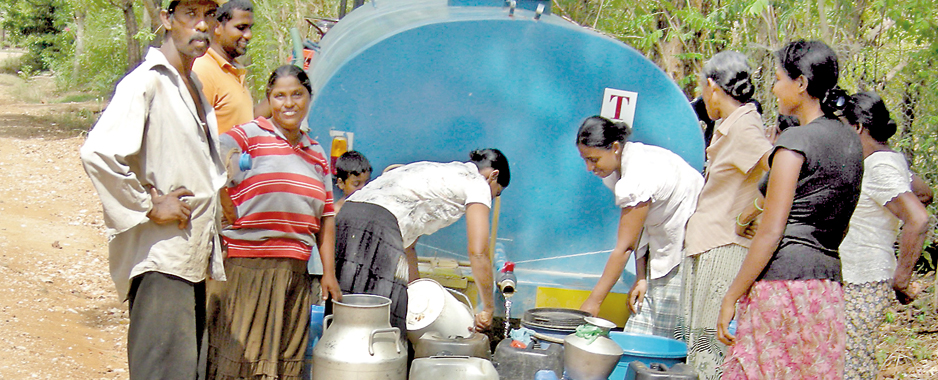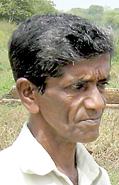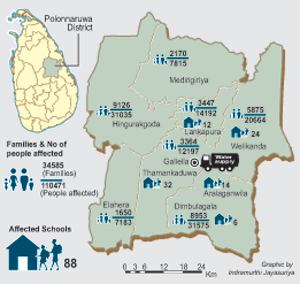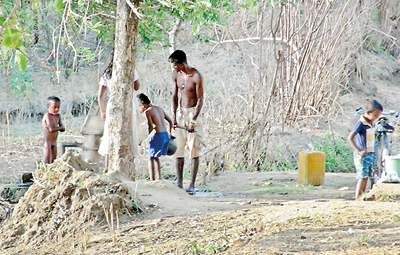News
Parched Polonnaruwa cries for water
W. Wijeratna (60) says be cannot recall a worse drought in close to three decades, as he stands in the shade of his tea kiosk in the village of Pelatiyawa, awaiting for the water bower to come along the dry, dusty road. “It hasn’t rained since April. I have lived here since 1984, but not seen our wells and tanks dry up like this before,” he says.

A sight for relieved eyes: Villagers in a remote corner of the Dimbulagala Division fill up pots and pans from the weekly bowser
Like him, several hundred villagers in this remote corner of the Dimbulagala Division, eagerly await with pots and pans lined up along the roadside, the arrival of the weekly water bowsers. It’s their only source of drinking water for the past several months, and the lines are likely to grow longer, as those seeking Government assistance to obtain water, increases by the day.
“We were providing water to 37 villages, but within the past three days, it increased to 40, as three more villages reported that their sources of drinking water have dried up,” said Dimbulagala Divisional Secretary (Additional Government Agent ), M.U. Nishantha, when the Sunday Times met him at his office on Thursday.
A special room has been set up at the DS office to handle the distribution of drinking water, which includes issuing fuel for the bowsers and settling the fast-accumulating water bill they have to pay the Water Board which provides the water from the plant at Gallella in the Manampitiya area. When an official there is asked how bad the situation is in the district, he is quick to quip, “When the Parakrama Samudraya has run dry, what more can I say.”
School children are among the hardest hit by the water scarcity. More than 90 schools in the Polonnaruwa district have sought assistance to obtain water from the respective Divisional Secretariats (AGA’s office).
At the Maithrigama Primary School in Welikanda, the 53 students and five teachers are among those facing severe hardships due to the water shortage. “We have a rainwater collection tank, but it dried up several weeks ago. The water bowser comes once a week or once in two weeks, and then we manage to fill up the tank, but, by now, that water too is finished,” school principal Dhammika Rupasinghe said.
The students have been asked to bring two bottles of drinking water, as the school can no longer guarantee clean water for them. “Some students brought contaminated water from the canal close by, so we have to check their bottles and make sure they don’t drink contaminated water,” Rupasinghe said. The principal and teachers who live in the few residential facilities available on the school premises, are equally affected by the drought.

Retd. water management officer Kingsley Siriratna
“The canals from which we used to bathe and wash are all dry. Now we have to walk up to four km to the Carson Wewa to bathe and wash our clothes. However, elderly villagers too feeble to walk the long distances, have opted to bathe in leftover stagnant water in the canals, which also serves the animals.
According to latest statistics compiled by the Disaster Management Centre of the Polonnaruwa District, a total of over 35,000 families comprising over 110,000 persons have been affected by the drought. The worst affected areas include Dimbulagala, Welikanda, Tammankaduwa, Hingurakgoda, Elahera, Medirigiriya and Lankapura.
At the village tea kiosk in Namalgama in Welikanda, talk of the drought dominates the conversation among villagers. W.G. Jayatillake, a soldier on home leave from his station in Kilinochchi, along with other villagers, lament the lack of a long term solution to the recurrent problem of the shortage of drinking water in this dry zone part of the country.
“The only hand-pump in our village was installed a few years ago, but has lain broken for many months now. One solution would be to install more hand-pumps,” Jayatillake said.
Retired water management officer in the Namalgama area, Kingsley Siriratna lives by the side of a dried up tank, one of many in the district which are overgrown with a thick undergrowth of plants covering acres of land which were once covered with water. “We have one small well in our village, from which we can get clean water, but we have to get there in the morning and collect water in cans and buckets, because, by afternoon, the well runs dry, as many people collect water from it,” he said.
For D.L. Priyawardena who assumed duties as Welikanda Divisional Secretary, less than a week ago, it’s an uphill task to deal with the growing demand for government intervention to provide drinking water for the villagers. “We have detailed bowsers to provide water to all the needy villages in my Division, and doing our utmost to maintain as efficient a service as possible,” he says.
Renuka Damayanthi, a mother of two from Pelatiyawa, was one of the fortunate ones to get her can of water filled from the ‘tractor –bowser’ that came to her village last Thursday. She is not sure when the next round of water supplies will arrive, so she wants to fill up as much as possible. “The children have to be given clean water, otherwise they can fall ill. That is a problem that most parents face,” she says.
 |
By evening, people gather on the tank bund to look upon the fast dwindling levels of water, be it of the Parakrama Samudraya, the Giritale tank or the Minneriya tank. A foul stench emanates from the Minneriya tank where the receding water levels have left scores of dead fish polluting what remains of the once massive water body. Across, on the other side of the tank, elephants gather to quench their thirst. Humans and animals alike, await the monsoons which they hope will come sooner than later.
Indebted farmers lament broken election promises
Despite promises made to the North Central Province farmers, before the Provincial Council election, to grant relief to farmers who have to pay back loans taken for farming activities, they remain unfulfilled, according to Polonnaruwa Progressive Farmers Association President M.K. Jayatissa.
Many of the farmers who obtained loans earlier this year for harvesting, have had their crops destroyed by the severe drought affecting the area, and hence are unable to meet their repayments. “The farmers are in receipt of letters from banks calling for the payment of loan installments. I have received a letter from my bank myself, asking for the due amount,” Jayatissa said.
He said managers at the relevant State banks have said they are yet to receive instructions on whether to waive off the loans or give the farmers more time to settle them.
Farmers are granted loans up to Rs. 59,000 to harvest one hectare of land, which has to be paid back in six monthly installments, at an interest rate of around 12% per annum.
Jayatisssa said that, in addition to loan repayments, farmers have had to pawn their jewellery and tractors to get by till the next harvesting season.
Woes of the Veddah
 |
The severe drought in Rathugala in the Bibile area has brought near disaster to the Veddah population. There are about 98 Veddah families living in this area caught up in the severe drought. Their plantations are devastated. This year’s dry weather is said to be the worse ever with the Rambakan oya that flows through the villages almost dry.
Follow @timesonlinelk
comments powered by Disqus


















